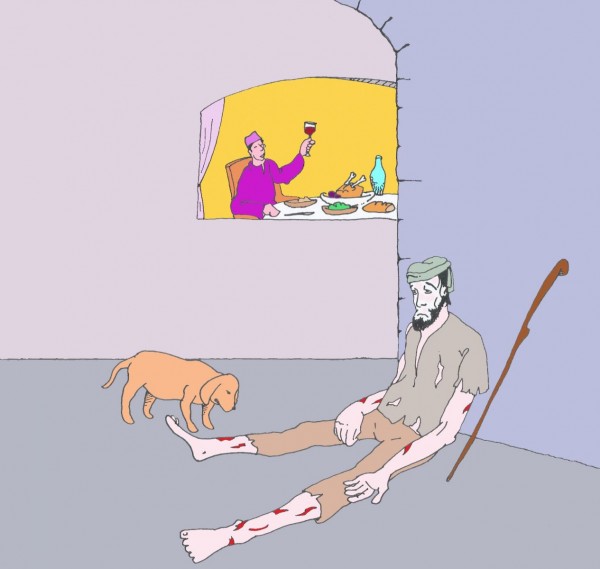
This weekend we celebrate the Twenty-Sixth Sunday in Ordinary Time, following cycle C of the readings, and at Mass we will hear the well-known parable of poor Lazarus and the rich man who ignored him (Lk 16,19-31), a beautiful and unsettling narrative that, like other memorable parables of Jesus—the good Samaritan, the prodigal son, the shrewd administrator, and others—are found only in the Gospel of Luke.
There is an important detail in the story: Jesus gives a name to the beggar, Lazarus, but not to the rich man. Tradition has attempted to correct this alleged weakness of the text, naming "Dives" the wealthy man, but this is a late practice—it seems that it originated with Peter Chrysologus in the fifth century—completely alien to the Gospel of Luke.
Several things call our attention here: first, it is not common for the characters of a parable to have a name. In fact, Lazarus is the only character in a story told by Jesus who has it. What was the name of the father of the prodigal son and his two children, or the woman who lost the coin, or the man who fell into the hands of bandits on his way to Jericho, or the Samaritan who helped him, or the priest who passed by? We don’t know, we are never told: when telling his stories, Jesus always presents his characters as representative prototypes, examples of attitudes and of ways of being that never become specific individuals: his heroes and villains are just «a man» , «a woman», «a father», «a son», «a rich man», «the owner of a vineyard». Only Lazarus has a name.
Secondly, it is surprising that, in the same parable, one of the two characters is named and the other is not. And, in any case, perhaps we would have expected that, if things were going to be this way in this occasion, Jesus would have given a name to the rich, important and successful person, and not to the miserable beggar. «There was a beggar at the gates of Dive’s mansion», Jesus could have begun, and it would have seemed very logical to everyone. But he does just the opposite: «There was a rich man who feasted sumptuously every day, and at his gate lay a poor man named Lazarus».
None of that is casual (as nothing is casual in the gospels), much less a weakness of the text. On the contrary: it is, without doubt, a subtle way to communicate a message.
By giving the poor man a name, Jesus underlines his humanity: and so, instead of reifying him, instead of turning him into a thing («a beggar»), he helps those who listen to the story see him as a person, as someone who once he had a family, parents who, when he was born, gave him that name. Lazarus has a life, like everyone else.
And, by naming Lazarus and thus humanizing him, Jesus is telling us that the problem with the rich man was precisely that he could not see the beggar laying at the door of his house for the human being he was. Certainly, he did not see him as his equal. Neither while they were both alive—had he seen Lazarus as a person then, he would been moved by his poverty and cared for him—, nor when the two died, when he treated him as his inferior, someone to whom he did not want to speak directly even once, and in whom he discovered, in fact, a slave: «Abraham», the rich man will say, «send Lazarus to bring me water; send him to my house, to warn my brothers».
The parable shows what happens when we worship money: we end up thinking that only those who have wealth are people. In our eyes, the rest, those who have nothing, are deprived of humanity by their poverty.
But there is more: if the text underlines the humanity of the poor by giving him a name, what does it do by not giving a name to the rich man?
In that, there is also a message. Two, in fact. On the one hand, Jesus invites us, as he always does when the characters in his parables are anonymous, to identify ourselves with them. Here we should ask ourselves, Am I like the rich man? Do I despise and ignore those who live in dire poverty?
In addition, by not giving a name to the rich man, who then stands in stark contrast to poor Lazarus, Jesus wants us to see that, through his contempt of the beggar, the rich man was depriving himself of humanity. His total lack of empathy turned him into what he despised. Being human is being merciful and supportive. To us, to be humane means to be caring and compassionate. The profound indifference with which the rich man treated the beggar harmed Lazarus, obviously, for the poor vagabond could have used some help. But it also hurt the rich man himself: by ignoring Lazarus, the wealthy man snubbed the opportunity to act as a human being, and so he became dehumanized.
The lesson of this «game of names», in short, invites us to see everyone as people, not things. After reading the story, we must commit to never denying anyone’s name. To recognize that everyone has one and that nobody should be reified, is the first, basic step to start seeing everyone we meet (whatever their condition) as the person they are. That is, to see them as God sees them. And it is the first step, also, to avoid losing our own humanity.









